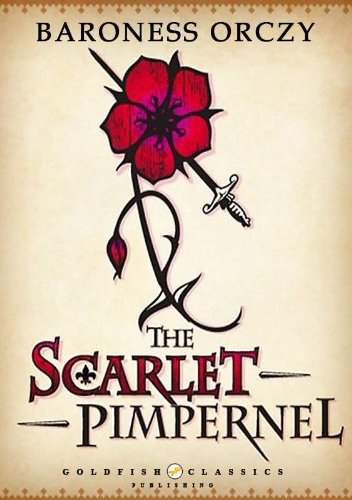Book Review: The Scarlet Pimpernel by Baroness Emmuska Orczy
It is the height of the Reign of Terror, after the fervor of the French Revolution turned from freedom to revenge. In an effort to unify the country both against outside enemies and counter-revolutionaries, the Committee of Public Safety holds trials of those suspected of acting against the Revolution, and guillotines those found guilty, however specious the charge. This falls heaviest against those of the aristocratic class, who abused their power in the years before the Revolution and incited resentment among those they’d lorded it over. Entire families were condemned, even those too young to have committed crimes. But if unjustly accused, French nobles have one slim hope. The Scarlet Pimpernel!

The Scarlet Pimpernel is known as such because of the device the leader of a band of young English gentlemen uses in his communications. A common wayside flower, even considered something of a weed, its sap is an irritant that can cause rashes if the flowers are picked without gloves. The plucky Englishmen receive secret communications from their leader with this sigil, and the French government receives taunting calling cards marked with the pimpernel after each successful rescue of innocent aristocrats.
But who is the Scarlet Pimpernel, master of disguise? The French government, in the person of M. Chauvelin, envoy to England, would dearly like to find out. And he thinks he’s found the perfect spy: Lady Marguerite Blakeney, nee Marguerite St. Just. Thanks to her marriage to the foppish Sir Percy Blakeney, she’s highly placed in British society; she is a very clever woman, skilled at acting and snooping; and Chauvelin has come into possession of a piece of paper that proves her brother Armand St. Just is a member of the League of the Scarlet Pimpernel. If Marguerite does not help him expose the Scarlet Pimpernel, her brother will be sent to the guillotine.
Marguerite has her own problems in addition to Chauvelin’s threats. A couple of years ago, she had spoken harsh words against a particular aristocrat in what she thought was confidentiality. He turned out to actually be guilty of plotting against the new French government, tried and condemned, with Marguerite announced as the denouncer. As a result, she is viewed with suspicion by many in British society, particularly the French emigres, and her husband turned cold to her on their very wedding night.
While she sympathizes with the efforts of the Scarlet Pimpernel, for Marguerite thinks the Committee has gone too far, trading the life of a man she does not know for that of her brother…is tempting. Pity she has no idea who the Scarlet Pimpernel might be!
This 1905 novel is actually the novelization of a stage play by the same author, adapted from a short story she’d previously written. The play became a hit, allowing her to sell the book, which itself became a big seller. The Baroness (originally from Hungary) gifted popular culture with the “rich idiot with no day job who is secretly a swashbuckling crusader for justice” plot element later picked up by Zorro, the radio Shadow and Batman. She wrote multiple sequels and tie-ins.
At its heart, this is a romance story. Two people who should be in love, who are clearly very attracted to each other, are kept apart by obstacles that prevent them from connecting until the end of the book. Miscommunication, suspicion, secrets, and then the actions of the enemies of the young couple intervene to draw out the conclusion.
Marguerite is our viewpoint character, though she is not formally introduced until Chapter Five: Marguerite. We follow her investigations, and do not learn who the Scarlet Pimpernel is until she does. Once she knows the truth, we follow her attempts to reach the Pimpernel in time to prevent tragedy, allowing the author to conceal a few more twists.
Baroness Orczy was very much in favor of the superior social position of aristocracy. (Hmm, could there be a clue to why?) Thus, the Pimpernel and his men spend zero time considering the plight of innocent non-aristocrats who might be facing the guillotine. And other than St. Cyr, the rascal who Marguerite accidentally denounced, no consideration that aristocrats might have their death sentences coming to them for past behavior.
Content note: There’s a heavy element of anti-Semitism; this is used to set up a dig at the French for being blindly prejudiced, but plays it straight until the reveal.
Overall: This is one of the great romantic adventure novels, and part of the ancestry of superheroes. Highly recommended.
Here’s a trailer for the 1934 movie!

